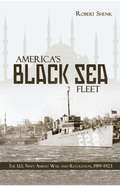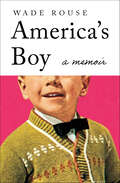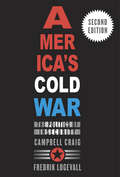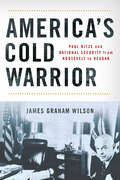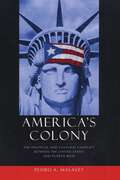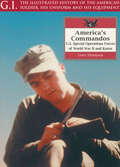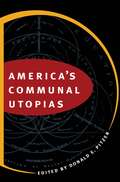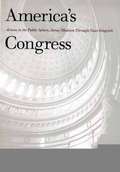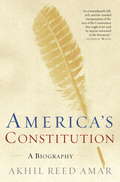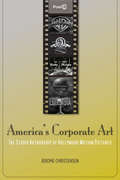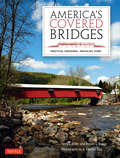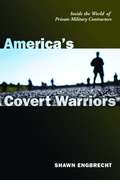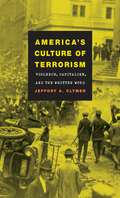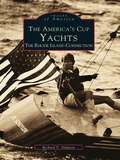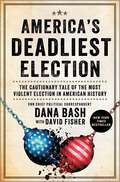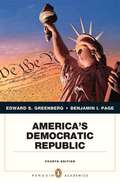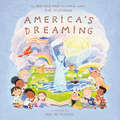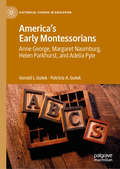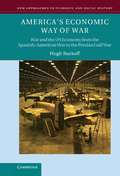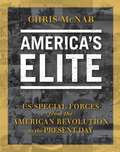- Table View
- List View
America's Black Founders: Revolutionary Heroes & Early Leaders with 21 Activities
by Nancy SandersCelebrating the lesser known but significant lives and contributions of our nation's early African American leaders, this multicultural complement to most children's books on the American Revolution covers a wide spectrum of subjects, including military, art, religion, and science. Weaving the histories of dozens of men and women--soldiers, sailors, ministers, poets, merchants, doctors, and other community leaders--to properly recognize them among the founders of the United States of America, this text gives a better sense of what these individuals accomplished and the times in which they lived. Activities include celebrating Constitution Day, cooking colonial foods, publishing a newspaper, petitioning their government, and more. This valuable resource also includes a time line of significant events, a list of historic sites to visit or explore online, and Web resources for further study.
America's Black Sea Fleet
by Robert ShenkIn a high-tempo series of operations throughout the Black Sea, Aegean Sea and eastern Mediterranean, a small American fleet of destroyers and other naval vessels responded ably to several major international crises including the last days of the Russian Revolution and the 1920-1922 Turkish Nationalist Revolution. Officers and men of the navy's "four-piper" destroyers began by investigating circumstances on the ground in mainland Turkey right after World War I, and by transporting American relief teams to ports throughout Turkey and Southern Russia to aid the tens of thousands of orphans and refugees who had survived the wartime Armenian genocide.Then the destroyers assisted in the final evacuation of 150,000 White Russians from the Crimea to Constantinople (one of the final acts of the Russian Revolution); coordinated the visits of the Hoover grain ships to ports in Southern Russia where millions were enduring a horrendous famine; witnessed and reported on the terrible dolorosa of the Greeks of the Pontus region of Turkey; and, in September of 1922, conducted the evacuation of hundreds of thousands of Greek and Armenian refugees from burning Smyrna. This latter event was the cataclysmic conclusion of the Turkish Nationalist Revolution, which had begun in early 1920.After Smyrna, the destroyers escorted Greek steamers in their rescue of ethnic Christian civilians being expelled from all the ports of Anatolian Turkey. As the conclusion of a long war between Nationalist Turks and an invading Hellenic Greek army, these people were being forced out of their ancestral homes by the Turks. Sometimes American destroyers carried hundreds of such refugees to friendly ports on their own weather decks.Upon the burning of Smyrna in September of 1922, Admiral Mark Bristol's small fleet had grown to some 26 naval vessels, most of them destroyers, although some cruisers, naval repair vessels and supply ships also came, and the battleships Arizona and Utah also appeared briefly. It was during 1922 that the destroyer Bainbridge rescued 482 of 495 men, women and children from the burning French transport Vinh Long in the Sea of Marmora. The destroyer accomplished this by the expedient of ramming the large French ship so the exploding ammunition could not continue to force the vessels apart. For this action, Lieut. Commander W. Atlee Edwards was awarded the Medal of Honor by America, and the Legion of Honor by France.Over four years, Admiral Bristol maintained a strong grip on American naval and diplomatic affairs throughout the region. Headquartered at the American Embassy at Constantinople, Bristol also worked to further American business interests in Turkey, and tended to favor Turks over Greeks and Armenians in the process. Many Americans were convinced that Bristol was biased on behalf of the Turks, and a couple of navy captains risked their careers by speaking out about impending Turkish massacres that Bristol wanted to hush up.Several later-famous admirals saw duty in Bristol's small navy, including William Leahy, Thomas Kinkaid, Julian Wheeler, Tip Merrill, Japy Hepburn and Dan Gallery, while statesman Allen Dulles was one of Bristol's key diplomats. Most of these men and most of the sailors, too, enjoyed the terrific nightlife of Constantinople that existed right alongside all the refugee heartbreak. When their duties kept them at sea or alongside grain ships in Russia or moored at the spartan Black Sea ports, the Americans kept their spirits up by racing ships' boats, shooting game, sightseeing, and (especially) by playing baseball. Captain Pratt Mannix even took advantage of his ship's briefly anchoring near the Gallipoli battlefield to become the first American to swim the famous Hellespont
America's Boy: A Memoir
by Wade Rouse&“A revelatory story about acceptance, pride, and the many ways even a seemingly prejudiced family can surprise us&” by the bestselling author of Magic Season (The Washington Post).Indie Next List &“Great Read&” SelectionAmerican Library Association&’s Inaugural &“Rainbow List&” Selection In this memoir, writer and journalist Wade Rouse delivers a humorous and heartwarming account of his Midwestern childhood and coming of age as a gay man. Born in Granby, a small farm town in the southwest Missouri Ozarks, Wade was a fish out of water as long as he could remember—or at least since he participated in his family&’s mock Miss America pageant when he was just five years old, clad in his grandmother&’s red &“whore&” heels and his mother&’s black-and-white polka-dot bikini. Life didn&’t get easier in Wade&’s conservative hometown, especially after his older brother died just a month after Wade graduated junior high school. It was then that Wade buried his brother—and his sexuality, so his parents wouldn&’t mourn the loss of a second son. Finally, after years of a descent into obsessive-compulsive behaviors and overeating, Wade was able to come out to himself, losing weight and gaining confidence until he had nothing left to hide. Filled with memories of happiness and heartbreak, America&’s Boy is both &“a quirky tribute to [Rouse&’s] rural Ozark family, and an easily digestible, homespun tale of a bygone era in Middle America&” (Time Out Chicago).&“A storyteller and a memoirist in the best sense of the words. . . . Reading Rouse&’s memoir is more like sitting with a good friend and a cold beer, trading stories and remembering those things that may have been painful or tragic at the time, but must now be respected for what they are.&” —Metro Weekly
America's Civil War
by Brooks D. SimpsonBrief but thorough summarization of the history of the period, complete with an anotated biography.
America's Cold War: The Politics of Insecurity, Second Edition
by Fredrik Logevall Campbell Craig“A creative, carefully researched, and incisive analysis of U.S. strategy during the long struggle against the Soviet Union.” —Stephen M. Walt, Foreign Policy “Craig and Logevall remind us that American foreign policy is decided as much by domestic pressures as external threats. America's Cold War is history at its provocative best.” —Mark Atwood Lawrence, author of The Vietnam War The Cold War dominated world affairs during the half century following World War II. America prevailed, but only after fifty years of grim international struggle, costly wars in Korea and Vietnam, trillions of dollars in military spending, and decades of nuclear showdowns. Was all of that necessary? In this new edition of their landmark history, Campbell Craig and Fredrik Logevall include recent scholarship on the Cold War, the Reagan and Bush administrations, and the collapse of the Soviet regime and expand their discussion of the nuclear revolution and origins of the Vietnam War to advance their original argument: that America’s response to a very real Soviet threat gave rise to a military and political system in Washington that is addicted to insecurity and the endless pursuit of enemies to destroy. America’s Cold War speaks vividly to debates about forever wars and threat inflation at the center of American politics today.
America's Cold Warrior: Paul Nitze and National Security from Roosevelt to Reagan
by James Graham WilsonIn America's Cold Warrior, James Graham Wilson traces Paul Nitze's career path in national security after World War II, a time when many of his mentors and peers returned to civilian life. Serving in eight presidential administrations, Nitze commanded White House attention even when he was out of government, especially with his withering criticism of Jimmy Carter during Carter's presidency. While Nitze is perhaps best known for leading the formulation of NSC-68, which Harry Truman signed in 1950, Wilson contends that Nitze's most significant contribution to American peace and security came in the painstaking work done in the 1980s to negotiate successful treaties with the Soviets to reduce nuclear weapons while simultaneously deflecting skeptics surrounding Ronald Reagan. America's Cold Warrior connects Nitze's career and concerns about strategic vulnerability to the post-9/11 era and the challenges of the 2020s, where the United States finds itself locked in geopolitical competition with the People's Republic of China and Russia.
America's Colony: The Political and Cultural Conflict between the United States and Puerto Rico (Critical America #43)
by Pedro A MalavetThe precise legal nature of the relationship between the United States and the people of Puerto Rico was not explicitly determined in 1898 when the Treaty of Paris transferred sovereignty over Puerto Rico from Spain to the United States. Since then, many court cases, beginning in 1901, have been instrumental in defining this delicate relationship.While the legislation has clearly established the nonexistence of Puerto Rican nationhood and lack of independent Puerto Rican citizenship, the debate over Puerto Rico's status continues to this day.Malavet offers a critique of Puerto Rico’s current status as well as of its treatment by the U.S. legal and political systems. Puerto Rico is a colony of the United States, and Puerto Ricans living on this geographically separate island are subject to the United States’s legal and political authority. They are the largest group of U.S. citizens currently living under territorial status. Malavet argues that the Puerto Rican cultural nation experiences U.S. imperialism, which compromises both the island's sovereignty and Puerto Ricans’ citizenship rights. He analyzes the three alternatives to Puerto Rico's continued territorial status, examining the challenges manifest in each possibility, as well as illuminating what he believes to be the best course of action.
America's Commandos: U.S. Special Operations Forces of World War II and Korea (G.I.)
by Leroy ThompsonA photographic history of elite units in WWII and Korea, including uniforms, equipment, and more. America deployed a diverse group of special operations forces (SOF) throughout World War II and in Korea. These elite units quickly earned a redoubtable reputation and proved themselves adept at hit-and-run raids, gathering intelligence in long range patrols, rescuing POWs, and living and fighting in hostile environments. This valuable study includes more than 100 rare and unusual photographs of the men, uniforms, special equipment, and insignia of these elite troops, accompanied by informative captions. Units covered include the Marine Raider regiments and Paramarines, Ranger battalions, &“Merrill&’s Marauders,&” the Special Service Force, OSS teams, Naval CDUs, and ski and mountain troops. America&’s Commandos is a key addition to the G.I. Series and examines some of America&’s most feared and capable elite forces.
America's Communal Utopias
by Donald E. PitzerFrom the Shakers to the Branch Davidians, America's communal utopians have captured the popular imagination. Seventeen original essays here demonstrate the relevance of such groups to the mainstream of American social, religious, and economic life. The contributors examine the beliefs and practices of the most prominent utopian communities founded before 1965, including the long-overlooked Catholic monastic communities and Jewish agricultural colonies. Also featured are the Ephrata Baptists, Moravians, Shakers, Harmonists, Hutterites, Inspirationists of Amana, Mormons, Owenites, Fourierists, Icarians, Janssonists, Theosophists, Cyrus Teed's Koreshans, and Father Divine's Peace Mission. Based on a new conceptual framework known as developmental communalism, the book examines these utopian movements throughout the course of their development--before, during, and after their communal period. Each chapter includes a brief chronology, giving basic information about the group discussed. An appendix presents the most complete list of American utopian communities ever published. The contributors are Jonathan G. Andelson, Karl J. R. Arndt, Pearl W. Bartelt, Priscilla J. Brewer, Donald F. Durnbaugh, Lawrence Foster, Carl J. Guarneri, Robert V. Hine, Gertrude E. Huntington, James E. Landing, Dean L. May, Lawrence J. McCrank, J. Gordon Melton, Donald E. Pitzer, Robert P. Sutton, Jon Wagner, and Robert S. Weisbrot.
America's Congress: James Madison Through Newt Gingrich
by David R. MayhewTo understand American politics and government, we need to recognize that members of Congress are more than agents of societal interests and preferences -- they also act with some autonomy and consequence in the public sphere. In this illuminating book, a distinguished political scientist examines the actions of members of Congress throughout American history, assessing their patterns and importance and their role in the U. S. system of separation of powers.
America's Constitution: A Biography
by Akhil Reed AmarIn America's Constitution, one of this era's most accomplished constitutional law scholars, Akhil Reed Amar, gives the first comprehensive account of one of the world's great political texts. Incisive, entertaining, and occasionally controversial, this "biography" of America's framing document explains not only what the Constitution says but also why the Constitution says it. <p><p>We all know this much: the Constitution is neither immutable nor perfect. Amar shows us how the story of this one relatively compact document reflects the story of America more generally. (For example, much of the Constitution, including the glorious-sounding "We the People," was lifted from existing American legal texts, including early state constitutions.) In short, the Constitution was as much a product of its environment as it was a product of its individual creators' inspired genius. <p>Despite the Constitution's flaws, its role in guiding our republic has been nothing short of amazing. Skillfully placing the document in the context of late-eighteenth-century American politics, America's Constitution explains, for instance, whether there is anything in the Constitution that is unamendable; the reason America adopted an electoral college; why a president must be at least thirty-five years old; and why-for now, at least-only those citizens who were born under the American flag can become president. <p>From his unique perspective, Amar also gives us unconventional wisdom about the Constitution and its significance throughout the nation's history. For one thing, we see that the Constitution has been far more democratic than is conventionally understood. Even though the document was drafted by white landholders, a remarkably large number of citizens (by the standards of 1787) were allowed to vote up or down on it, and the document's later amendments eventually extended the vote to virtually all Americans. We also learn that the Founders' Constitution was far more slavocratic than many would acknowledge: the "three fifths" clause gave the South extra political clout for every slave it owned or acquired. <p>As a result, slaveholding Virginians held the presidency all but four of the Republic's first thirty-six years, and proslavery forces eventually came to dominate much of the federal government prior to Lincoln's election. <p>Ambitious, even-handed, eminently accessible, and often surprising, America's Constitution is an indispensable work, bound to become a standard reference for any student of history and all citizens of the United States. <p>[This text is listed as an example that meets Common Core Standards in English language arts in grades 11-12 at http://www.corestandards.org.]
America's Corporate Art: The Studio Authorship of Hollywood Motion Pictures (1929-2001)
by Jerome ChristensenContrary to theories of single person authorship, America's Corporate Art argues that the corporate studio is the author of Hollywood motion pictures, both during the classical era of the studio system and beyond, when studios became players in global dramas staged by massive entertainment conglomerates. Hollywood movies are examples of a commodity that, until the digital age, was rare: a self-advertising artifact that markets the studio's brand in the very act of consumption. The book covers the history of corporate authorship through the antithetical visions of two of the most dominant Hollywood studios, Warner Bros. and MGM. During the classical era, these studios promoted their brands as competing social visions in strategically significant pictures such as MGM's Singin' in the Rain and Warner's The Fountainhead. Christensen follows the studios' divergent fates as MGM declined into a valuable and portable logo, while Warner Bros. employed Batman, JFK, and You've Got Mail to seal deals that made it the biggest entertainment corporation in the world. The book concludes with an analysis of the Disney-Pixar merger and the first two Toy Story movies in light of the recent judicial extension of constitutional rights of the corporate person.
America's Covered Bridges
by Terry E. Miller A. Chester Ong Ronald G. KnappThe history of North America is in many ways encapsulated in the history of her covered bridges. The early 1800s saw a tremendous boom in the construction of these bridges, and in the years that followed as many as 15,000 covered bridges were built. Today, fewer than a thousand remain.Without covered bridges to span the rivers and provide access to vast swaths of the interior that had previously been difficult to access-America never would have developed the way she did. In America's Covered Bridges, authors Terry E. Miller and Ronald G. Knapp tell the fascinating story of these bridges, how they were built, the technological breakthroughs required to construct them, and above all the dedication and skill of their builders. Each of the bridges, whether still standing or long gone, has a story to tell about the nature of America at the time-not only about its transportational needs, but the availability of materials and the technological prowess of the people who built it.This book is absolutely packed with fascinating stories and information-passionately told by two leading experts on this subject. The book will be of tremendous interest to anyone interested in American history, carpentry and early technology.
America's Covert Warriors: Inside the World of Private Military Contractors
by Shawn Engbrecht<p>Private military contractors, especially those in Iraq, have taken on far more than their original mandates required. Initially intended for combat support, they have become full-fledged warriors, many with little experience, scant oversight, and no accountability to the rules of engagement that constrain the U.S. military and coalition forces. When the occupation of Iraq turned into a fight against an insurgency, overwhelming U.S. and coalition military forces, the demand for private military contractors skyrocketed in 2003 and 2004. The explosive growth of such firms as Blackwater, Crescent, and others resulted in a relaxation of recruitment standards at precisely the same time that the U.S. military’s own standards of recruitment began to falter, but the standards for private military contractors fell much further and faster. The predictable result included excessive civilian casualties, a human tragedy whose full dimensions have yet to be seen by the American public. <p>Shawn Engbrecht has been training and recruiting private military contractors for more than a decade. Acknowledging that some private military contractors are out of control, he argues that the oft-made suggestion to fire them all is not the solution. Instead, Engbrecht contends that with proper training and development of recruits, along with enforceable regulation and oversight, private security companies can be successfully integrated into a total force package with a professional operational staff.</p>
America's Culture of Terrorism
by Jeffory A. ClymerAlthough the terrorist attacks of 11 September 2001 shocked the world, America has confronted terrorism at home for well over a century. With the invention of dynamite in 1866, Americans began to worry about anonymous acts of mass violence in a way that differed from previous generations' fears of urban riots, slave uprisings, and mob violence. Focusing on the volatile period between the 1886 Haymarket bombing and the 1920 bombing outside J. P. Morgan's Wall Street office, Jeffory Clymer argues that economic and cultural displacements caused by the expansion of industrial capitalism directly influenced evolving ideas about terrorism.In America's Culture of Terrorism, Clymer uncovers the roots of American terrorism and its impact on American identity by exploring the literary works of Henry James, Ida B. Wells, Jack London, Thomas Dixon, and Covington Hall, as well as trial transcripts, media reports, and the cultural rhetoric surrounding terrorist acts of the day. He demonstrates that the rise of mass media and the pressures of the industrial wage-labor economy both fueled the development of terrorism and shaped society's response to it. His analysis not only sheds new light on American literature and culture a century ago but also offers insights into the contemporary understanding of terrorism.
America's Cup Yachts, The: The Rhode Island Connection
by Richard V. SimpsonThe dominance of the New York Yacht Club, in possession of the America's Cup between 1851 and 1983, has given Newport, Rhode Island, the status of yachting capital of the world. Seven of the most respected America's Cup defenders were built in Bristol, Rhode Island. The state's contribution to racing yacht technology began in Bristol, when N.G. Herreshoff designed and built the Vigilant in 1893. The Goetz Custom Sailboat Company continues the Bristol tradition of building superior sailing vessels, many of which have been challengers for the coveted America's Cup, beginning with the America 3 in 1992. In his sixth volume for the Images of America series, author Richard V. Simpson explores the allure of the America's Cup yachts and racing through more than 200 images from his own diverse collection. The photographs focus on the beauty and dignity of the yachts, the genius of engineering minds, and the handiwork of skilled crafters. Within these pages, view a variety of rare images captured by turn-of-the-century biograph and stereoscopic cameras, and experience the majestic dance of the yachts as they jockey for position, from the starting gun to the crossing of the finish line.
America's Deadliest Election: The Cautionary Tale of the Most Violent Election in American History
by Dana BashThe violent election of 1872 that serves as a warning for today's divided politics. <P><P> From CNN’s Chief Political Correspondent Dana Bash, the fast-paced story of the extraordinary election that led to hundreds of murders, warfare in the streets of New Orleans, two governors of Louisiana—and changed the course of politics in our country. <P><P> The Election of 1872 was the most contentious in American history. After both parties complained of corruption, neither candidate would concede, two governors claimed office and chaos erupted. Rival newspapers engaged in a bitter war of words, politicians plotted to overthrow the government, and their supporters fought in the streets and attempted assassinations. The entire country watched in grim fascination as the wounds of the Civil War were ripped open and the promise of President Grant’s Reconstruction faltered in the face of violent resistance and the birth of the Ku Klux Klan. <P><P> In this riveting book, Dana Bash and David Fisher tell the incredible, little-known story of the election that pushed democracy to the breaking point, and sparked historic events including: <P><P> The Colfax Massacre, in which at least 150 Black men were killed by white supremacists The extraordinary train race from New York to New Orleans for control of the state government The election of the first black Congressman from Louisiana in the face of violent resistance The Supreme Court ruling that ended Reconstruction and became the foundation of Southern segregation, changing the American legal system for the next century Readers will find eerie parallels to today's divided political landscape and leaders willing to seize power no matter the cost. An eye-opening warning of what's at stake and what it takes to protect our democracy, this is a must-read tale of America's deadliest election. <p> <b>New York Times Bestseller</b>
America's Democratic Republic (Fourth Edition)
by Edward S. Greenberg Benjamin I. PageUpdated in a new 4th edition, America's Democratic Republic is a brief, affordable book in an accessible trade-like format that explores the clash between the democratic aspirations of the American people and the republican foundations of our Constitution. Written with a lively, narrative style, this text traces the storyline of American government and focuses on the long standing and inescapable tension between the country's 18th century republican Constitutional foundations and the democratic aspirations of the American people.
America's Dirty Wars
by Russell CrandallThis book examines the long, complex experience of American involvement in irregular warfare. It begins with the American Revolution in 1776 and chronicles big and small irregular wars for the next two and a half centuries. Examples taken from the American experience reveal that fighting - and, more so, winning - all types of wars is extraordinarily complex, frustrating, controversial and bloody. What is readily apparent in dirty wars is that failure is painfully tangible while success is often amorphous. Successfully fighting these wars often entails striking a critical balance between military victory and politics. America's status as a democracy only serves to make fighting - and, to a greater degree, winning - these irregular wars even harder. Rather than futilely insisting that Americans should not or cannot fight this kind of irregular war, Russell Crandall argues that we would be better served by considering how we can do so as cleanly and successfully as possible.
America's Dreaming
by Bob McKinnonFrom New York Times bestselling author Bob McKinnon comes a story about seeking inspiration from our past to become our best selves in the future.Have you ever felt alone? Have you ever desperately wanted to fit in? America understands how you feel.America dreams of adventures, making new friends, and being strong. But America&’s first day at a new school turns out to be a nightmare.Fortunately, America&’s new teacher introduces the Welcome Wagon—a cart filled with books about real-life historical figures who also had trouble feeling accepted. When America falls asleep that night, Amelia Earhart, Sojourner Truth, Martin Luther King Jr., and Emma Lazarus jump off the pages to share their stories—inspiring America to return to school the next day and make their dreams come true.While we never see America, Bob McKinnon&’s lyrical writing and Thai My Phuong&’s unique, sweeping art helps readers see the world through America&’s eyes and encourages us all to be as kind as we are brave, because everyone always deserves to feel welcome.
America's Early Montessorians: Anne George, Margaret Naumburg, Helen Parkhurst and Adelia Pyle (Historical Studies in Education)
by Gerald L. Gutek Patricia A. GutekThis book traces the early history of the Montessori movement in the United States through the lives and careers of four key American women: Anne George, Margaret Naumburg, Helen Parkhurst, and Adelia Pyle. Caught up in the Montessori craze sweeping the United States in the Progressive era, each played a significant role in the initial transference of Montessori education to America and its implementation from 1910 to 1920. Despite the continuing international recognition of Maria Montessori and the presence of Montessori schools world-wide, Montessori receives only cursory mention in the history of education, especially by recognized historians in the field and in courses in professional education and teacher preparation. The authors, in seeking to fill this historical void, integrate institutional history with analysis of the interplay and tensions between these four women to tell this educational story in an interesting—and often dramatic—way.
America's Economic Way of War: War and the US Economy from the Spanish-American War to the First Gulf War
by Hugh RockoffHow did economic and financial factors determine how America waged war in the twentieth century? This important new book exposes the influence of economics and finance on the questions of whether the nation should go to war, how wars would be fought, how resources would be mobilized, and the long-term consequences for the American economy. Ranging from the Spanish-American War to the Gulf War, Hugh Rockoff explores the ways in which war can provide unique opportunities for understanding the basic principles of economics as wars produce immense changes in monetary and fiscal policy and so provide a wealth of information about how these policies actually work. He shows that wars have been more costly to the United States than most Americans realize as a substantial reliance on borrowing from the public, money creation and other strategies to finance America's war efforts have hidden the true cost of war.
America's Economic Way of War: War and the US Economy from the Spanish-American War to the Persian Gulf War
by Hugh RockoffHow did economic and financial factors determine how America waged war in the twentieth century? This important new book exposes the influence of economics and finance on the questions of whether the nation should go to war, how wars would be fought, how resources would be mobilized, and the long-term consequences for the American economy. Ranging from the Spanish-American War to the Gulf War, Hugh Rockoff explores the ways in which war can provide unique opportunities for understanding the basic principles of economics as wars produce immense changes in monetary and fiscal policy and so provide a wealth of information about how these policies actually work. He shows that wars have been more costly to the United States than most Americans realize as a substantial reliance on borrowing from the public, money creation and other strategies to finance America's war efforts have hidden the true cost of war.
America's Elite: US Special Forces from the American Revolution to the Present Day
by Chris McnabFrom Roger's Rangers to the Revolution, Civil War, World War I & II, Korea, Vietnam, Iraq, Afghanistan, and the Bin Laden raid, this book covers over 250 years of American Special Forces action. America's Elite takes the reader through some of the most dramatic special forces operations in US history, from sniping British commanders during the Revolutionary War to Riverine incursions in the Mekong Delta in Vietnam, and from demolition missions on D-Day to the SEAL assault on Osama bin Laden's compound in 2011. Training and selection procedures are explained in detail, and the book also describes some of the technologies that have separated regular soldiers from their Special Forces counterparts. Illustrated throughout with striking photography and artworks, America's Elite forms the most comprehensive and visually impressive single-volume guide to US Special Forces available.

